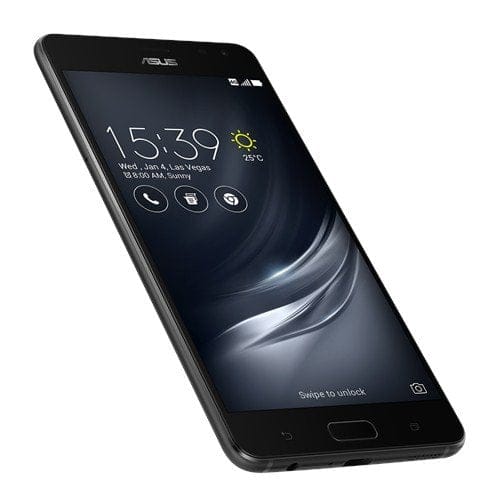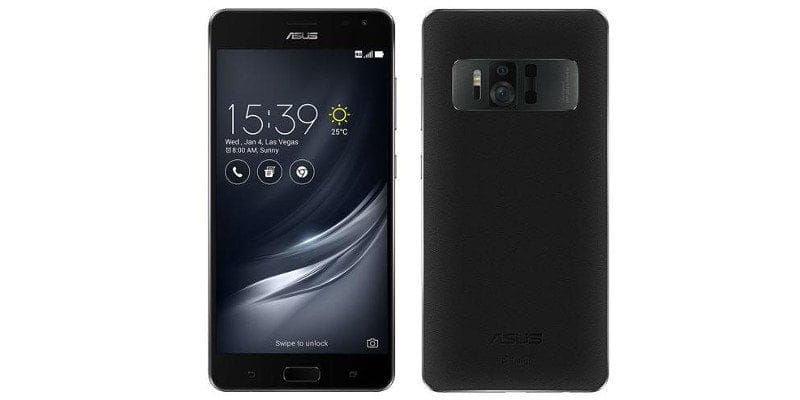Asus ZenFone AR
Augmented Reality and Virtual Reality will find their way into our everyday life more and more in the years to come. The first VR headsets have already appeared and AR has also been a household name since the Microsoft HoloLens. With the Asus ZenFone AR, a smartphone has now been announced that combines VR and AG in an interesting way.
Thanks to the support of Google Tango, the Asus ZenFone AR is one of the first "Tango-enabled" smartphones with a powerful Qualcomm Snapdragon 821 processor. Google Tango is responsible for the AR part of the smartphone. Google Daydream, which is also fully supported, takes care of the VR part.
Google Tango - Augmented Reality
The Asus ZenFone can influence our perception of reality through Google Tango. What we see through the camera of our smartphone, for example, can be expanded under computer control. Computer-generated objects or information can be displayed, overlaid or even controlled in real time. In order for Google Tango to be possible at all, the smartphone requires a large number of sensors and additional camera units that cannot be found on a conventional smartphone. The Asus ZenFone has a total of three cameras. In addition to a conventional main camera, which can also be used for image and video recordings, the smartphone also has a motion tracking camera and an infrared camera. Only through this combination of different cameras is it possible for Google Tango to capture the environment in three dimensions and enable AR.
Google Daydream - Virtual Reality
With the release of the Google Pixel Phone, Google Daydream was also released. Daydream also only works on a “Daydream-ready” device, which must meet certain requirements. One of the requirements is Android 7 and a compatible processor. With the Qualcomm Snapdragon 821 SoC, the Asus ZenFone AR has the same SoC as the Google Pixel, which is why Daydream is also supported.

Hardware of the Asus ZenFone AR
5.7 Inch Super AMOLED
Not only the processor of the Asus ZenFone AR is impressive, the rest of the hardware equipment can also be assigned to the high-end range. A Super AMOLED panel with a 5.7 inch display diagonal and a resolution of 2.560 x 1.440 pixels is used as the display. The display is protected by scratch and shock resistant Corning Gorilla Glass 4.
Up to 8GB memory
A powerful 8GB of RAM ensures the best possible performance. The smartphone is also available with 6GB of RAM. A UFS 2.0 data storage with up to 256GB is installed as internal storage. Expansion of the memory using a MicroSD memory card is supported. The ZenFone AR is cooled by so-called “vapor cooling”, which is why nothing should stand in the way of longer VR + AR sessions.
23 Megapixel main camera
The main camera uses a 23 megapixel Sony IMX318 image sensor with a TriTech + autofocus system consisting of a phase detection AF, a laser AF and a continuous AF. In addition, the main camera offers an f / 2.0 aperture, a 4-axis OIS and a dual LED flash. A front camera is of course also available. This resolves with a maximum of 8 megapixels, also has an autofocus and a dual LED flash.
Connectivity, battery and others
The Asus ZenFone AR is a dual SIM smartphone and supports all cellular standards, including the common frequency bands. Bluetooth 4.2 and WiFi 802.11a / b / g / n / ac are also supported. GPS, A-GPS, GLONASS and BDS are available for satellite navigation. A 5-magnet loudspeaker ensures the best possible sound reproduction. A 3.5mm headphone jack is available. A fingerprint scanner is located below the display. The capacity of the non-exchangeable battery is 3.300mAh. Power Charge and Quick Charge 3.0 are supported.
Source: https://www.asus.com
The Asus ZenFone AR will be delivered in the second quarter 2017. Asus has not yet made any pricing information.

